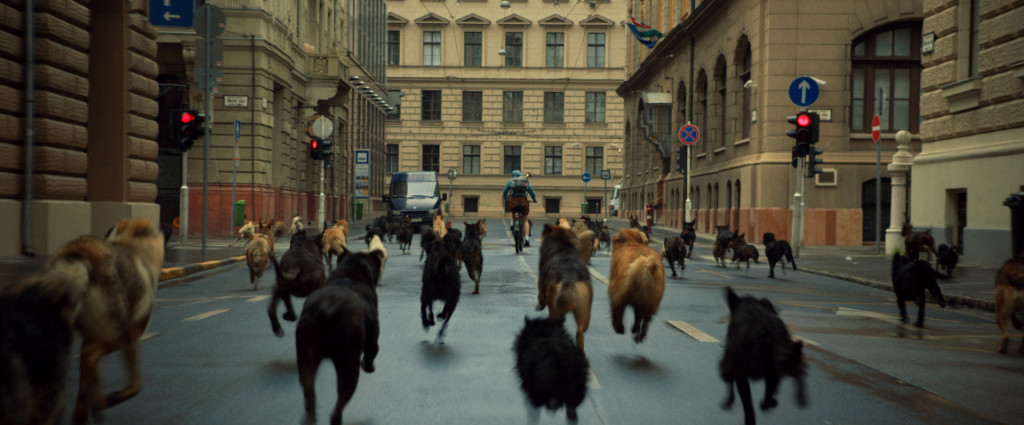By: Addison Wylie
Once finishing White God, one feels the need to exclaim in delight over the film’s overwhelming strengths. That, or look up other opinions. I did both.
Reviews have been circulating ever since the film’s win at the 2014 Cannes Film Festival (White God won the Un Certain Regard Prize), but I didn’t dare look too far into other write-ups. However, the film’s press notes state something very interesting:
“Kornel Mundruczó’s newest film is a story of the indignities visited upon animals by their supposed human superiors, but it’s also a brutal, beautiful metaphor for the political and cultural tensions sweeping contemporary Europe.”
In hindsight, if you juxtapose the political message into White God’s story, it does make sense in the context. However, Mundruczó’s incredible film works just as well if you lean more towards that former understanding of the film – a battle between man versus animal.
Not all the humans in White God are heartless. The film’s joinery begins with a relationship between a young girl (Lili played by Zsófia Psotta) and her mixed-breed dog Hagen. Hagen isn’t a pest, but he is a big, lumbering hound. The klutzy pup makes life difficult for Lili’s father Dániel, who is spending time with his daughter for a couple of months. Unfortunately, the pet serves to be too much of a complication, and Dániel abruptly throws the mutt onto the busily confounding streets of Budapest.
White God suddenly turns into a silent film as we follow Hagen adapting to strange environments and acquaintances and partnering up with other forgotten animals. He goes through a number of owners, and is soon finding himself in the midst of a personal change. He’s forced to shift his personality, which doesn’t weigh nicely once the life he’s living becomes very dangerous.
Kornel Mundruczó’s film sounds like a pipe dream that shouldn’t work, but it does in magical ways. The filmmaker has taken the liberty of using real dogs in his emotional drama which adds risk to his production. A risk that if completed successfully will gain a stronger connection to his audience. Mundruczó, and some extraordinary stunt and animal coordinators, make every dog a fleshed-out character. The team has chosen not to use Hagen as a cute manipulative gimmick, but instead use the dog as a heart-wrenching perspective for the audience. The filmmaker is also equipped with a skilled editor who uses these top notch canine performances correctly in order to maintain the human connection Hagen has with movie goers.
As they try and reconnect, Lili and Hagen travel along similar paths. While Psotta’s teenage hurdles are acceptably watchable and easy to care for, the path Hagen takes is much more ferocious. It’s why Hagen’s story boils to a firry and impassioned climax where the tables are turned, and Mundruczó injects horror into White God. Yet another example of how fearless Kornel Mundruczó is.
White God is perfect. It’s an amazing achievement in filmmaking and features some of the best animal integrations I’ve ever seen in a movie. The only patrons who’ll have issues with Kornel Mundruczó’s movie are those who turn queasy by strobe lighting and are sickened by scenes featuring animals in intense situations – no matter what the context is. To those who qualify: consider that a warning. But, I hope you can overcome the impediments and watch this tremendous film.




Leave a comment